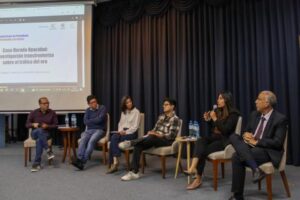Shell companies in Ecuador exporting millions in gold, illegal trafficking in Indigenous lands in the Brazilian Amazon, and unregulated extraction in Venezuela and Colombia are just some of the mechanisms feeding a transnational network of illegal mining, marked by corruption, violence and environmental destruction.
This was revealed by Golden Opacity, a cross-border investigation led by the news outlet Convoca in Peru, in collaboration with journalists and editors from Repórter Brasil, Plan V in Ecuador, Consejo de Redacción and Rutas del Conflicto in Colombia, and Armando.Info and the Rebel Investigative Alliance (ARI) — comprised of Runrunes, El Pitazo, and Tal Cual — in Venezuela.
Over 11 months, nearly 20 Latin American journalists and editors identified gold trafficking routes, companies, and state negligence through databases, document analysis and fieldwork in Amazonian, Andean and coastal regions.
“Uncovering illegal networks and the harmful practices of economic and political power requires brave journalists who are solid in their methodology, quick to learn about public interest issues, and humble enough to collaborate in difficult and complex contexts,” Milagros Salazar, director of Convoca and coordinator of Golden Opacity, told LatAm Journalism Review (LJR).
“In challenging times, collaborative journalism is an excellent path full of opportunities,” Salazar added.
This collaborative effort earned them the 2025 King of Spain International Journalism Prize in the Narrative Journalism category, beating out 112 entries from across the region. The prize jury described the investigation as “an extraordinary work of excellence” and “a piece that breaks traditional journalism molds.”
One of the greatest challenges of this cross-border investigation was ensuring reporters’ safety.
In Colombia, for example, the investigation focused on the department of Antioquia, a region that produces at least a quarter of the country’s gold exports. The area is known for high levels of conflict due to the presence of paramilitary groups.

Golden Opacity is a cross-border investigation led by the news outlet Convoca in Peru, in collaboration with journalists and editors from Repórter Brasil, Plan V in Ecuador, Consejo de Redacción and Rutas del Conflicto in Colombia, and Armando.Info and the Rebel Investigative Alliance (ARI) in Venezuela. (Photo: Courtesy)
“We know it is a dangerous region, but we understood that with the proper protocols, we could do it well,” Óscar Parra, director of Rutas del Conflicto, told LJR.
Some of their precautions included visiting the area for short periods of time, hiring a fixer familiar with the region to guide reporters and arrange interviews in advance, and designating a travel sponsor in Bogotá to monitor the reporter’s journey and stay in constant communication with the Convoca team.
They followed similar practices in the other countries — Ecuador, Peru and Venezuela — where safety protocols and a travel plan were established before they entered the field.
“In Peru, we conducted a very detailed intervention plan on the ground. Our goal was to track gold shipments leaving informal or illegal areas and entering gold processing plants such as Laytaruma,” Salazar said.
“We used drones to track the trucks, while another journalist in the office received the license plate information to check who owned the vehicles, whether they had permits, criminal records, and so on,” she added.
Another measure was that some of the investigations were not signed by the reporters doing the fieldwork but instead by editors. This was done to protect the identities of the reporters and prevent possible reprisals.
“Another step we took was to have the editors and heads of the news organizations serve as spokespeople for interviews after the investigation was published,” Juan Carlos Calderón, editor-in-chief of Plan V, told LJR. “The editing process was also crucial to leave no loose ends, avoid mistakes, and prevent future legal issues.”
According to Calderón, the editing process took about four months and involved rigorous fact-checking. Each outlet conducted its own internal editing, in addition to an external review by Convoca, which led the project.
“For topics like these, it is very important to have an outside perspective asking the right questions,” Calderón said. “There are things that seem obvious from within but are not.”
The Golden Opacity project was funded by the National Endowment for Democracy (NED), a U.S.-based foundation.

Part of the Dorada Opacidad team during the Fourth Latin American Meeting of Journalism to Investigate Corruption and Criminal Networks (ELPIC). (Photo: Courtesy)
This foundation has previously supported various independent journalism initiatives in Latin America. However, when U.S. President Donald Trump signed an executive order to freeze foreign aid, it was among many projects that were affected.
“The Golden Opacity investigation will continue because it is a necessary public service,” Salazar said. “Journalism has made it through crises before. Every challenge also presents an opportunity.”
For example, Plan V, in collaboration with Convoca and the Latin American Center for Investigative Journalism (CLIP), has continued investigating Ecuador’s gold exports.
On January 20, the reporting team discovered that these exports are carried out not only by companies but also individuals.
“We keep expanding the investigation because we continue growing the gold export database — registered companies, concessions, permits, mine locations, and so on,” Calderón said. “As we continued expanding and reviewing the database, we realized that what we had found at first was just the tip of the iceberg.”